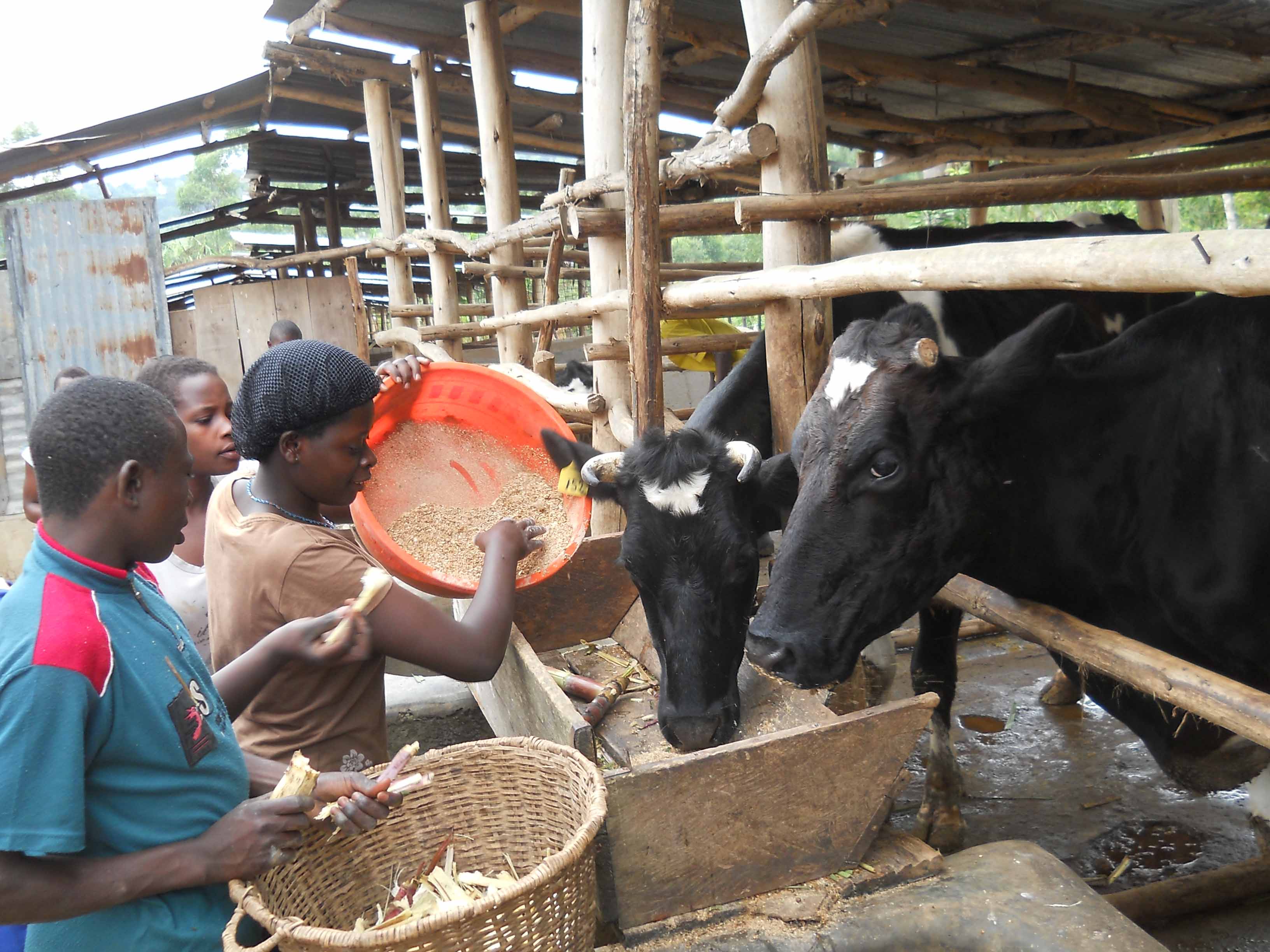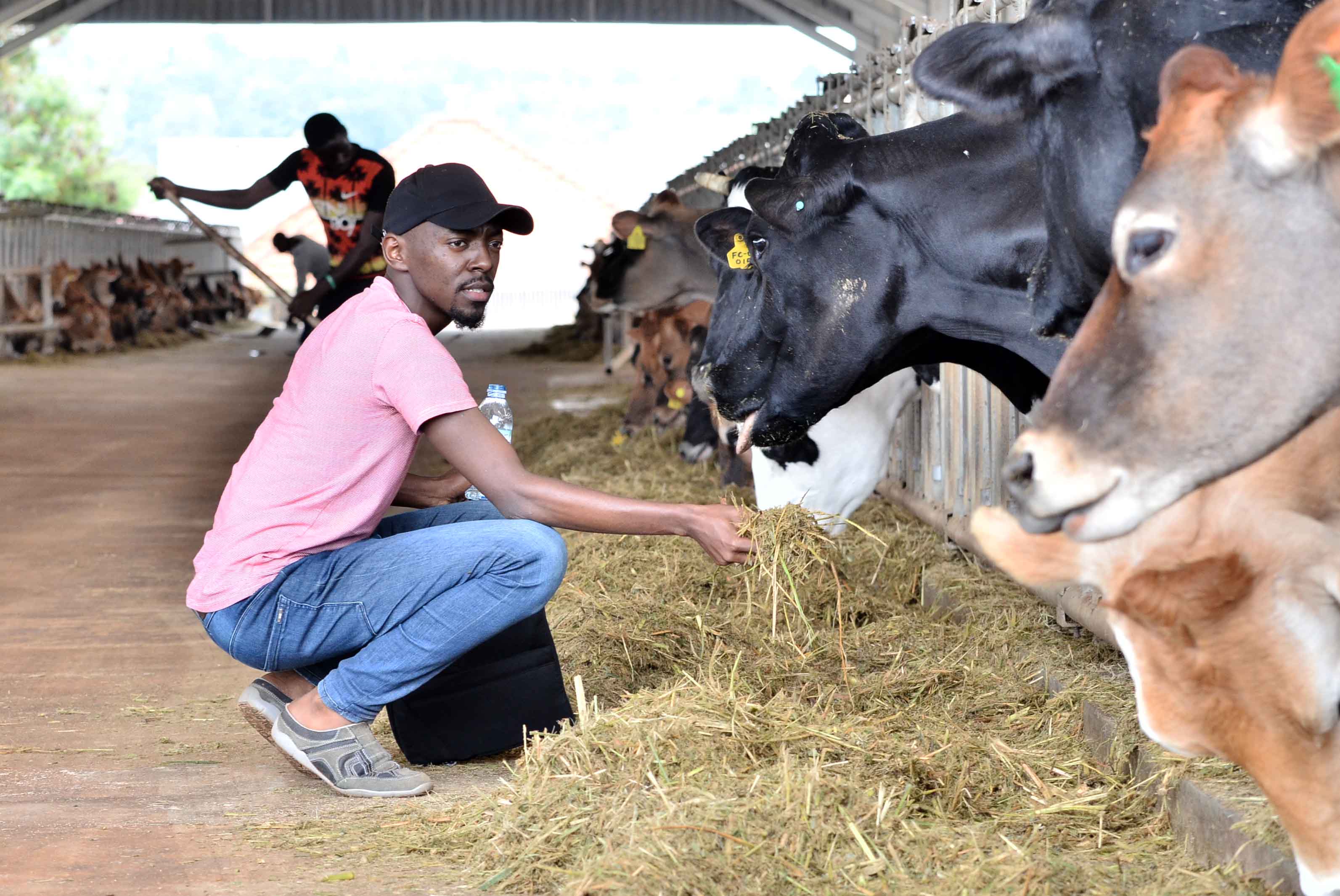Prime
The many benefits of keeping a dairy cow

Dairy cows must be fed on good and clean feeds. Photos | Michael J Ssali
What you need to know:
- A dairy cow is also a source of daily income for the farmer since the market for milk is widely available and it is a good form of employment. It is labour intensive and provides good physical exercise for the farmer.
Dairy farming is mainly to do with milk production but there are lots of other benefits linked to it.
It is a good source of milk which is known to be nature’s most balanced food for domestic consumption and for sale. The family which keeps a dairy cow is almost assured of good nutrition and food security.
Its dung and urine can be used to improve soil fertility and to increase crop production. It is also possible to generate biogas from cow dung. The farmer gets clean energy and has less need to spend money on firewood and charcoal.
Why dairy farming
It is argued quite correctly that a farmer who keeps a dairy cow turns inedible plant materials on his farm such as grass, tree leaves, and crop residues, into milk and meat which are good food for human consumption.
A dairy cow is also a source of daily income for the farmer since the market for milk is widely available and it is a good form of employment. It is labour intensive and provides good physical exercise for the farmer.
Tony Kyambadde, a trained agriculturist and coordinator of projects at Caritas Masaka Diocese Development Organisation (MADDO), says it is difficult for smallholder crop farmers to succeed without keeping livestock as well. “It is important for all crop producers to sustain soil fertility and a dairy cow kept under zero grazing is a good idea,” he says. “If the cow is well fed it produces a lot of dung and urine which can be used to fertilise the soil. These days cow dung is very expensive and it would not be economical for smallholder farmers to keep buying it. Close integration of dairy cow keeping and crop production is recommended because some crop residues are fed on cows and the cow dung is used as fertilizer for the soil, resulting in bigger crop yields. The farmer then sells increased volumes of vegetables and food crops like banana, maize, and coffee.”

Cow dung heap ready for use in the garden as manure.
Training farmers
For decades MADDO has been involved in helping local farmers in the Masaka region to take up dairy cattle keeping at zero-grazing as a way to increase income generation. Kyambadde shared with Seeds of Gold the benefits of dairy cattle keeping and the challenges often experienced in some dairy cattle keeping households.
“All the members of the household should be interested in the enterprise before embarking on it,” he says. “It is no use for the husband or the wife to suddenly bring a cow into the home without prior knowledge of the marriage partner. Everyone in the home including children should have a feeling of ownership of the cow for them to give it the best care.”
Dairy cow management
He emphasised the importance of feeding in dairy cow management and said that there should be advance preparation for a good source of fodder and water before the cow arrives in the home. “Good quality fodder grass should be available and ideally there should be space allocated to pasture in the homestead planted with fodder grass like Napier, Calliandra and Bracharia among others and fodder crops such as sweet potato vines. Such fodder plants should be planted all along the plot boundaries and runoff trapping gullies dug across the garden. Mutuba and mango tree leaves are good fodder for dairy cows and a farmer should plant such trees.”
Feeds
He said dairy cow keepers should constantly seek guidance about the best feeds for their animals from area agricultural services extension officers. He encourages farmers to learn how to make silage and hay for feeding their animals during times of food scarcity. The farmers are taught all about rainwater harvesting methods including helping them to purchase plastic rainwater tanks on credit. MADDO employs trained agriculturists who give regular training to farmers in dairy cow farming practices.
“Some grass species have protein while others have carbohydrates,” he said. “They should be given to the animals in recommended ratios. Feeding is the most important part of dairy cow keeping. It must be remembered that a lactating cow needs good feeding to produce enough milk for both her calf and for the farmer and his household to drink and to sell.”

Farmers should harvest rainwater.
Advice
He said the farmers must be helped to make important observations regarding the health and well-being of the cow. The farmer should know when castration of bull calves or dehorning should be done, when spraying acaricide to remove external parasites, and when the cow is on heat or sick. The housing of the dairy cow should be well done preferably with an iron roof and a concrete floor designed to trap and store the cow’s urine. Kyambadde said that there ought to be record keeping and transparency within the household regarding all the financial transactions. “Gender equity is very important because if the expenditure of the money obtained from milk sales is not well accounted for it may result in marriage conflicts and some members of the family may lose interest in the cow. They may not feel compelled to feed it well or to call in the vet doctor when it falls sick. Imagine a situation when the husband spends all the money on alcohol or uses it to acquire a second wife in the neighbourhood.” He said it is important for all the household members to regard themselves as beneficiaries of the enterprise. He goes on to say that if the parents pay school fees, or buy clothes for the children, using the money obtained from the sale of milk the children should be told so that they get to know that they are benefiting from the cow.
The farmer going into dairy cattle keeping must pay attention to what breed to purchase because some breeds produce more milk than others. Pure exotic cows are difficult to keep in East African climate conditions since they are not used to some types of parasites that are common here.
Normally the farmers keep cows that are 75 or 50 percent exotic. Farmers should be taught the importance of group marketing and forming cooperative societies.
People engaged in dairy cow keeping are expected to be scrupulously clean because they are food handlers. The milk produced must be clean and free from dirt and all harmful bacteria. The cow itself must be healthy, clean, and kept in a hygienic environment.
No cow should be milked when it is sick. All milking utensils and equipment must be washed with disinfectants and detergents and kept sterile all the time. Farmers must have well maintained and clean latrines complete with tippy taps for hand washing every time they visit a latrine. They should have rubbish heaps for metallic objects, plastic objects and organic waste materials.
Key fact
If feeds are being recommended by professionals such as animal health and production service providers, the professional must explain to the farmer the reasons for the claim of superior performance based on credible and verifiable scientific or experiential knowledge.
Advice
The farmer going into dairy cattle keeping must pay attention to what breed to purchase because some breeds produce more milk than others. Pure exotic cows are difficult to keep in East African climate conditions since they are not used to some types of parasites that are common here.




